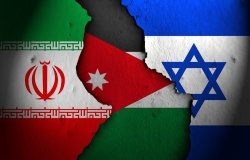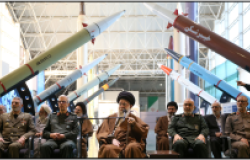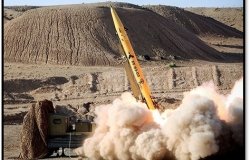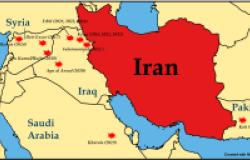For-Profit Terrorism
with Justine Rosenthal, Executive Editor, The National Interest, and Director, Council on Global Terrorism
Overview
This meeting, part of the ongoing Terrorism and Homeland Security Forum series, was co-sponsored by the Council on Global Terrorism, Georgetown University's Center for Peace and Security Studies, and the Woodrow Wilson Center's Division of International Security Studies.
Justine Rosenthal focused on the disturbing new trend of "for-profit terrorism," which is driven by the expanding illicit economy and porous borders of today's world. Though terrorists have always needed to finance their violent pursuits through illegal pursuits, money is becoming such a temptation that it is overriding ideological motivations in many instances. According to Dr. Rosenthal, terrorists use familiar ideological rhetoric to hide their profit goals. This helps them in two critical areas: in recruiting members with inspiring words, and in avoiding persecution and prosecution as criminals. For-profit terrorists maintain the rhetoric of a terrorist group, yet are not purely driven by an ideological cause.
For-profit terrorists start out with political motivations and turn into profit-seeking entities. Dr. Rosenthal pointed to three causes of this transformation. The first is the destruction of the leadership. The death or arrest of a leader changes the group's motivation. Abu Sayyef's (ASG) main goal was the establishment of a separate state for the minority Muslim population in the Philippines. But after the death of their leader, Jahjalani, the group expanded their kidnapping efforts 400 percent, spurred on by the receipt of high ransoms. Since the death of one of their leaders, the Islamic Movement of Uzbekistan (IMU) has similarly shifted its focus from the rise of Islam to maintaining its hold over the Caucasus drug trade and expanding its control of smuggling routes. The Revolutionary United Front (RUF) in Africa is also an example of a political group corrupted by the lure of diamond profits.
The second cause of transformation is a political shift that debunks the group's ideological basis. Revolutionary Armed Forces of Colombia (FARC) was forced to shift its goals away from promoting Marxism after the fall of the Soviet Union, and continues to prosper despite a lack of popularity and government attempts to negotiate peace. FARC's influence since the 1980s is directly correlated to the growth of the drug trade and the geographical expansion of the group's control. A telling indicator of FARC's increasing "for-profit" motivation is that the group now spends almost $110 million a year on chemicals needed to make cocaine, but only $15 million on weapons. Another example is the Provisional Irish Republican Army (PIRA). The recent peace process has pushed the PIRA to pursue new avenues of survival, as evidenced in its growing involvement in the drug trade and other types of organized crime. The third cause of transformation – inherent in all transformations – is an opportunity for financial gain so great that it subsumes the ideological motives. The lure of the diamond mining industry and the RUF is such an example.
Dr. Rosenthal argued that for-profit terrorists help create the anarchy they need to survive: drug production, kidnapping and smuggling all spread disorder as well as providing income. They exploit weak governments and effectively control them by bribing officials: FARC, for example, spends $12 million each year on bribes, while the RUF funded both sides of the Sierra Leone conflict to maximize disorder. These organizations also corrupt local populations by enticing them with opportunities that are better than those provided by the government or legitimate industries, and frightening them into submission with terror.
As the illicit economy expands and violent actors gain more market share, Rosenthal anticipated the rise of more disorder, more violence and more capable groups. Terrorists are more likely to cooperate with members of their own kind than with criminals: the IMU is believed to have cooperated with Al Qaeda, Abu Sayyef, Chechen terrorists and the Uighurs in China; the RUF with Charles Taylor, Hezbollah, Hamas, Abu Sayyaf and Al Qaeda; FARC with PIRA and the Basque separatist group ETA. These collaborations have led to expansion of illicit markets, increased disorder and more sophisticated violence. As terrorists expand international influence, the groups cultivate opportunities for trans-continental, trans-ideological networking and profiteering.
The newest hotspots of for-profit terrorism are Iraq and Afghanistan. In 2004, there was an average of two kidnappings per day in Baghdad, whereas now the figure is between 30 and 40 daily nationwide. Insurgents are paid anywhere from $100 to $2000 per attack. Governance vacuums and porous borders allow for the smuggling of oil, arms and drugs throughout the Middle East and South Asia. In Afghanistan, the opium market has dominated the country: poppy cultivation increased 59 percent from 2005 to 2006. Most of these increases were in the south, where the insurgency is growing. As in Iraq, much of the government is corrupted by bribes from terrorist cells, while kidnappings are up. With few options in the legal economy, young men turn to crime under the guise of a moral mission.
Dr. Rosenthal identified two special dangers that for-profit terrorist groups now pose: they have become guns for hire, willing to perform violence at the right price, and they provide more dangerous groups with a fully-funded, ideologically malleable partner. The more we understand this latter danger of the intertwining nature of these groups, the more aggressive our approach to tackling the problem should be. How should we deal with it? We know that peasant farmers need a viable alternative to drugs; we know that we need inter-governmental cooperation with intelligence and enforcement; we know that drug dealers can only bribe government officials to the extent that the state is unable to compensate and oversee them. Therefore we must strengthen weak states with comprehensive institution building and development programs. Further, we must broaden our conception of terrorism: as terrorist modes of survival evolve, so must our methods of countering them. As examples in Colombia and Sierra Leone have shown, ceding assets and power to terrorist groups through peace negotiations only strengthens and encourages the groups. Dr. Rosenthal concluded that we must identify and root out for-profit terrorists to limit their capabilities and influence.
Thank you for your interest in this event. Please send any feedback or questions to our Events staff.










